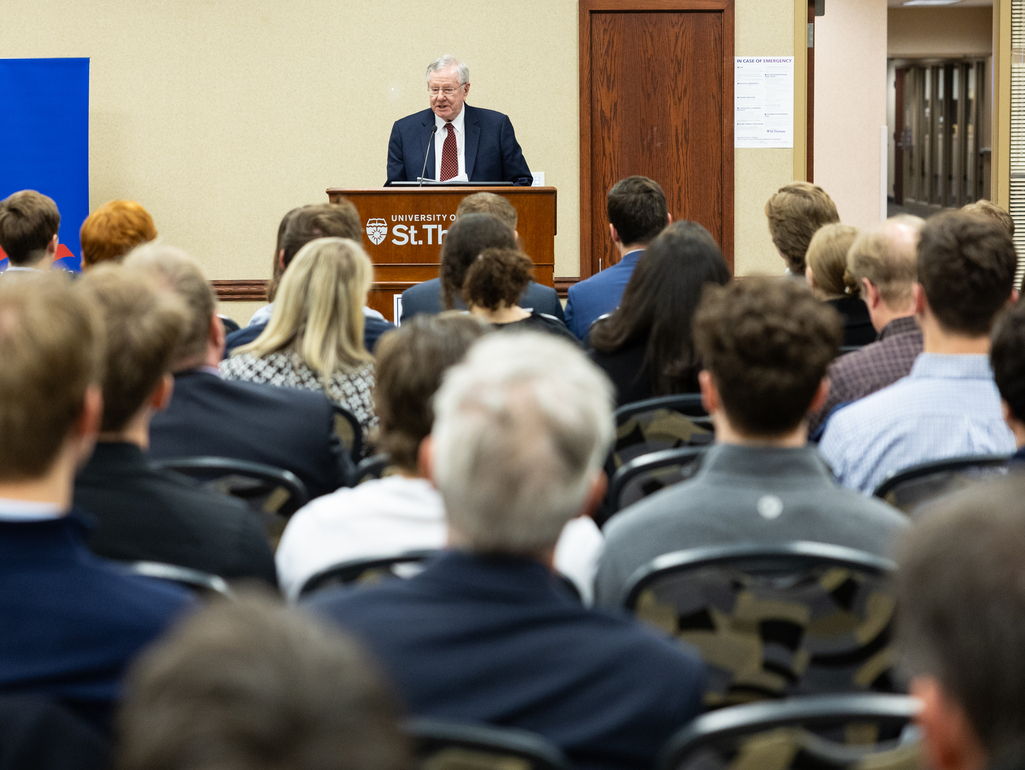Publishing executive Steve Forbes, the chairman and editor-in-chief of Forbes Media, spoke to a packed crowd Feb. 19 at the University of St. Thomas St. Paul campus on a range of topics, from entrepreneurship and capitalism to energy and the tax code.

On the topic of knowledge
“Today’s rarities become tomorrow’s commodities; the greatest example is the automobile,” Forbes said. “One hundred twenty years ago, the typical car cost about $110,000 in today’s dollars and was a toy for the rich. Along came Henry Ford and the moving assembly line, and what was a toy for the rich became something that every working person could afford.”
Forbes added, “This gets to a very basic question that the economist Thomas Sowell liked to ask: What is the difference between us today and people in the Stone Age? We have the same planet, same human body, same appetites, same resources available. What’s the difference between them and us? We have more knowledge, we know more. And that’s how you move ahead, finding and creating new knowledge, not forgetting all things.”
On the topic of progress
"People are living longer, being able to do things that were absolutely inconceivable even a few years ago. Take for example, your handheld what used to be called a cell phone, now a virtual supercomputer. If you had said a few years ago that your grandmother could operate a supercomputer, which then was about the size of this building, you would have gotten a very strange look. The handheld your grandmother is operating, without even knowing it, is a supercomputer. And it's amazing how we take these things for granted. Literally being able to get anything anywhere, anytime. So, if you place a call to outer Mongolia, and it takes more than six seconds you say what a piece of crap this is, what's taking so long. We take these advances for granted."
On the topic of innovation
"Once upon a time Steve Jobs, the founder of Apple, was asked to do marketing surveys and Steve Jobs said no, because people don't know what they want until I show them. No lack of self-esteem there. But he makes a good point about entrepreneurship. You only succeed by going out there providing something and hoping that people want it. So, in terms of terms of humanity, you may not love your neighbor, but you sure want to sell to your neighbor in a free market system. So, you're trying to figure out how do you persuade? How do I get you to park your money for something that you're offering? And so you, without even knowing it, you're expanding humanity also involves free enterprise, immensely complicated chains of cooperation."

On the topic of inventions
"When something is invented, you're constantly making improvements on it; little things each and every day. You go for example to the coffee shop. Start a Starbucks. You have usually three sizes 12, 16, 20-ounce, but you notice that the cups have lids. Those cups are the same size (open circumference). So, you don't have to have three different inventories of lids. Little things like that happen on an ongoing basis 1000s of times each day, constant improvements. Those things, we aren't even realizing it are making life even better."
On the topic of supply chains
"One quick example: restaurants – you may be going to one after listening to me tonight – farmers create the food, grow the food, there are seeds to grow the food. There are proper tools to be able to have them: delivery trucks and fuel, electric utilities, water and the like. In the restaurant, you have to have stoves, refrigerators, tables, utensils, everything, all those things and on and on. Even something as simple as a restaurant, immense supply chains are in operation."
On the topic of imperfection
"One of the things to keep in mind, when people criticize the economic system we have today, is that it involves people and when you involve people, you get imperfections; it’s human nature, that has not changed over the 1000s of years. Just look at the history books. Now in terms of the imperfections of humans, James Madison, the father of our Constitution, once wrote, he said, if we are angels, people are angels, we'd not need government. We'd not need laws. Manifestly, we're not angels. And so you do need laws. But there's a difference between sensible rules of the road, such as you don't drive 100 miles, say, in a school zone, to having minute regulations on where to drive when to drive what to drive, that kind of regulation tsunami that we're experiencing today."
St. Thomas College Republicans and Young America's Foundation were co-sponsors of the event.







